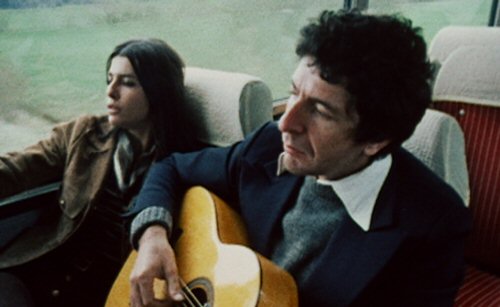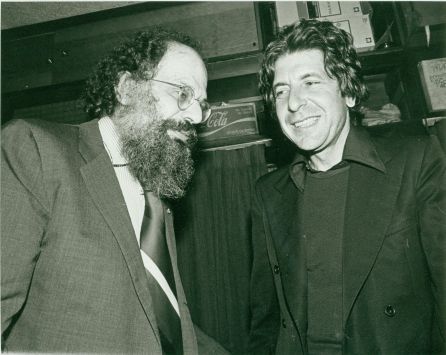 “If your life is burning well, poetry is just the ash.” – Leonard Cohen
“If your life is burning well, poetry is just the ash.” – Leonard Cohen
Missing in action since it was first filmed by Tony Palmer in 1972, Bird on a Wire, a documentary account of Leonard Cohen’s European tour, finally surfaced on DVD in 2010 after being painstakenly restored frame by frame by the director who described the long, complicated history on the extra audio features. It’s a shame the film didn’t garner more attention upon its DVD debut but for Cohen fans, the documentary is essential viewing and just as candid, raw and intimate as D.A. Pennebaker’s remarkable Bob Dylan portrait, Don’t Look Back (1967), which covered that singer/songwriter’s tour of England in 1965.
Bird on a Wire opens with a chaotic concert situation in Tel Aviv as aggressive security guards in orange coats try to stop audience members from approaching the stage and interacting with Cohen and his band. One is immediately struck by Cohen’s calm and sensible tone in the face of what appears to be a fascist police state as he says to the guards, “I know you’re just trying to do your job but you don’t have to do it with your fists.” His words have little effect though and so he returns to performing, introducing his next number with, “I’d like to sing you a song for the man in orange.” This doesn’t sit well either and the situation becoming intolerable. Cohen leaves the stage saying, “Let’s disperse quietly and be together somewhere else because the scene isn’t worth it….there’s no point in starting a war right now.” 
Palmer’s documentary, which does not follow the chronological order of the 1972 20-city tour that began in Dublin, jumps around instead in a seemingly random fashion but the overall effect is an unromanticized portrait of life on the road – a casual, homemade production that unfolds in vignettes like a diary video, some of it shot in color, some in black and white. There is footage of Cohen walking on the beach, swimming nude in a pool, fielding questions from journalists, flirting with numerous beautiful women backstage (one can only imagine his countless sexual conquests), showering with band mates and agonizing over his performance, saying more than once, “I disgraced myself, I have.”
There is also a refreshing honesty in his directness with fans, the media and his own touring group, whether he is joking with a backup musician about a poor performance (“It sounded like banging”) to answering a reporter who asks him, “What is success for you?” “Success is survival,” Cohen replies without a trace of smugness.
The tour is not without drama and a key episode highlights all the potential problems that can occur in a concert situation. A technical malfunction occurs in the sound system, affecting all the speakers and resulting in poor audio quality and feedback for several venues. A near mutiny situation arises with much finger pointing and accusations of blame. In one startling confrontation, some German fans come backstage to vent their anger and frustration. Cohen, anxious to put an end to the evening and be done with it, begins returning their money personally.
At the final concert in Jerusalem, Cohen broke down mid-way through his performance and left the stage, apologizing to the audience. We see him distraught backstage and then suddenly decide he needs a shave. He lathers up, shaves and is then coaxed back onstage for an emotional rendition of “So Long, Marianne” that leaves Cohen – and his musicians – in tears (According to one biographer, Cohen and some band members took LSD during his “shave break” and the effects began to kick in while they performed this song).
While all of the incidental details of life on the road along with its boring repetition have been well documented in other documentaries and films about music legends and musicians from The Rolling Stones’ C*cksucker Blues (1972) to Backstage (1998) with DMX, Jay-Z and others to the Wilco portrait, I Am Trying to Break Your Heart (2002), it’s particularly interesting to see Cohen in this environment because one doesn’t think of him as a rock star. His music was closer in nature to the French chanteurs such as Jacques Brel (whose music had an enormous effect on him) but his lyrics set him apart from any pop songwriter. Cohen was a poet, first and foremost, who discovered the power of marrying his words to music and was following in the footsteps of Beat poet Allen Ginsberg, whose musical recitations of his poetry reached a younger and broader audience in his later years. 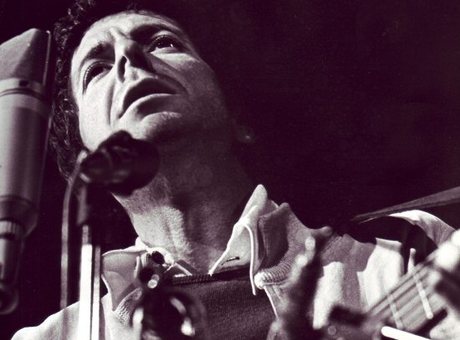
By this point in his career, as Bird on a Wire makes clear, Cohen was struggling to emerge from the Bob Dylan/folk movement stereotyping, despite the fact that his music was singular in nature and closer to a European tradition of performing. And this is the aspect of Palmer’s documentary that is so fascinating – to watch Cohen try to control the artistic process in a collaborative medium.
His creative instincts and ego demand perfection yet he often appears defeated and humbled by his unrealized expectations. In one revealing interview, he tells a reporter, “Sometimes you can live in a song but sometimes it is inhospitable and won’t admit you and you’re left banging at the door and everybody knows it….so it really depends a great deal on the moment, on the kind of shape you are in, how straight you are with yourself at the moment, how straight you’ve been with the audience. So many factors determine whether you are going to be able to make the song live.”
The best non-musical moments of Bird on a Wire are the quieter ones, showing Cohen composing a poem in his hotel room or reciting one for the camera. Likewise, the best musical highlights feature Cohen’s sparse, stripped-down compositions where his lyrics and voice pierce the heart and soul. There are moving renditions of “Sisters of Mercy,” “Story of Isaac,” “Famous Blue Raincoat,” and “Chelsea Hotel,” which he was still working out in terms of lyrics and musical execution. A song about a brief encounter with Janis Joplin at the Chelsea Hotel in New York City, Cohen’s version here of the latter song is more impassioned and profane than the final recorded version and demonstrates the fluid nature of Cohen’s art and his desire for spontaneity, something he found difficult to achieve in a concert tour where he often performed the same songs night after night.
Cohen fans in particular will get a kick out of seeing and hearing some of the musicians who appeared on his early albums such as organist/producer Bob Johnston and backup vocalist Jennifer Warnes, who would later enjoy top forty fame with “The Right Time of the Night” and “Up Where We Belong” (the theme from An Officer and a Gentleman), and perform her tribute album to Cohen, Famous Blue Raincoat.
To set the record straight, Palmer’s initial cut of Bird on a Wire was never screened publicly. The BBC saw a rough cut and agreed to buy it in that state but Cohen felt uncomfortable with the existing cut for several reasons, one being that Cohen looked “exhausted” most of the time. In reality, he was and had made it clear from the beginning that he didn’t like touring and often felt like “some parrot chained to his stand night after night.”
The main reason that the documentary even got made was because his manager, Marty Machat, thought it might broaden Cohen’s exposure, and because he wanted a visual record of the tour for he feared it might be his client’s last one. So Palmer’s rough cut and all of his footage was given back to Machat but there are varying accounts of what happened next. 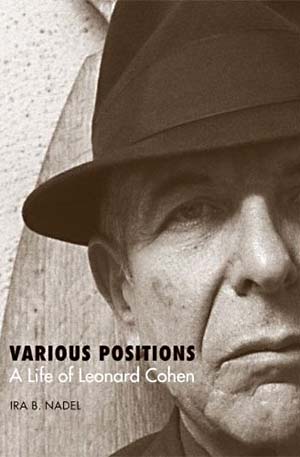
Ira B. Nadel, author of Various Positions: A Life of Leonard Cohen wrote that “Cohen was initially unhappy with the arty look of the film and wanted a stronger, documentary texture. He spent nearly six months editing the work, shifting its focus away from visual cliches to the deeper realities of his music….What Cohen wanted was a film that showed the live context of his music and his rapport with his audiences. Bird on a Wire did that but it also showed Cohen emotionally wasted. He felt exposed in the film and thought his vulnerability was inappropriate for public viewing.”
Yet, on the basis of the Bird on a Wire DVD which includes Palmer’s original cut, the above criticism doesn’t jive at all and, in fact, the correct title of the documentary is Bird on a Wire, named after Cohen’s song, not Bird on the Wire. OK, so it’s the difference of one word but the difference of one word makes a world of difference to a poet like Cohen. The only criticism of Bird on a Wire I have is one that is reflective of its era and time; Palmer includes some atrocity footage from the Vietnam War that is underscored by a Cohen song and it is unusually explicit and hard to watch. Plus it’s not needed. Cohen’s lyrics produce a similarly powerful but less manipulative vision of man’s conflicted nature. 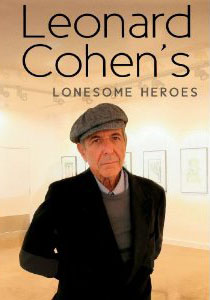
Cohen fans may also want to check out another Leonard Cohen documentary that is being distributed by the MVD Entertainment Group, Leonard Cohen’s Lonesome Heroes, in which the poet’s life and influences are chronicled and discussed by a panel of experts including Judy Collins (who provides the most illuminating insights about the songwriter), Rolling Stone writers Anthony DeCurtis and Michaeal Lydon, and Cohen’s fellow Buddist monk Kigen. An informative primer on the artist with a wealth of interesting archival clips and concert snippets, Lonesome Heroes is somewhat dry and academic in tone but it does shine a light on some of the unexpected musical influences on Cohen’s art such as Hank Williams, Ray Charles, Tex Ritter (who appears in a clip singing “High Noon”) and the poetry of Federico Garcia Lorca. 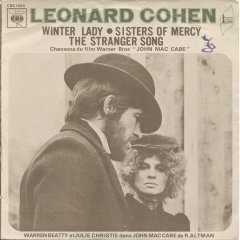
Certainly there have been many documentary and concert films with Leonard Cohen as the focus. Ladies and Gentlemen, Mr. Leonard Cohen (1965), a National Film Board of Canada documentary, directed by Donald Brittain and Don Owen, offers an intriguing look at the poet at an earlier stage in his career before he had even released his first album, Songs of Leonard Cohen (1967). And Leonard Cohen: Live at the Isle of Wight 1970, which was recently assembled in 2009 by documentary filmmaker Murray Lerner from unused footage from his original 1997 documentary, Message to Love: The Isle of Wight Festival. In the latter, Cohen was only featured performing one number, “Suzanne,” but Lerner’s new compilation includes all of the Cohen footage from the Isle of Wight concert and among the selected songs are “One of Us Cannot Be Wrong,” “Nothing Will Be Fine,” and “The Stranger Song,” which was used by director Robert Altman to open his ethereal western, McCabe and Mrs. Miller (1971). 
I was hoping Leonard Cohen: Live at the Isle of Wight 1970 would get a wider theatrical release than just New York and a few cities but it is not yet available for streaming or viewing at this point unless you purchase a copy (It was released on DVD and Blu-Ray in 2009). In the meantime, treat yourself to Tony Palmer’s Bird on a Wire which has risen like a phoenix from the ashes of time.
Websites of interest:
http://www.leonardcohen.com (Official Cohen site)
cohencentric.com (Leonard Cohen Considered)
http://www.hollywoodnorthreport.com/article.php?Article=7983
http://www.leonardcohenfiles.com/cover1.html
http://www.telegraph.co.uk/culture/tvandradio/8137028/Bird-on-a-Wire-preview.html



